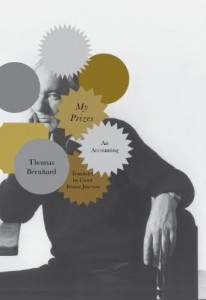Book Review: Of Spongy Minds and Award-Winning Books
Call it anarchistic boorishness, an artist chomping on the hand that feeds him. But at least Thomas Bernhard is honest about why he welcomes awards — he wants the money, especially because the amounts, given European largess to its culture-makers, are considerable.
My Prizes: An Accounting by Thomas Bernhard. Translated from the German by Carol Brown Janeway. Knopf, 129 pages, $22.
By Bill Marx
Understandably, little has been written about the dismal science of literary awards. With so much power and prestige at stake, writers and judges (often interchangeable groups) are wary of talking about the sausage-making means, focusing instead on the headline-grabbing ends (establishing literary standards, honoring worthy work, enlarging the readership for first-rate fiction and non-fiction). Here and there a book on the sociology of book awards turns up or someone examines their ‘soft’ culture power, such as Julia Lowell’s informative study about China’s government-fueled campaign to win the Nobel Prize in literature for its approved candidates. (Expatriate rebel Gao Xingjian was an ugly surprise for the country’s honchos.)
Incisive looks into the absurd machinery of awards — the compromises, hypocrisies, double-dealing, and plain old incompetence — are rare, perhaps because those involved generally accept that, for the sake of sales and credibility, the backstage doings must not be booted about in public. (Of course, gossip about the inside wheeling-and-dealing flies hither and yon.) Awards are the epitome of the consumer guide mentality – the premise is that the best volumes are selected by authorities for those who don’t have the time or expertise to evaluate what to read. The elemental problem is that a committee, always stuffed with too many cooks, inevitably serves up bland and safe fare — after all, a spice-less winner has to satisfy the majority of the panel’s tastes. And when the majority has its condescending idea of how the “popular” palate can be elevated, the outcome — cultural pablum — is predictable.
One of the few writers to look seriously at book awards is novelist William H. Gass, whose essay “Pulitzer: The People’s Prize” in his collection Finding a Form does a fine job dealing with the game of marketing “quality,” excoriating “the critics and customers” who year after year treat the Pulitzer goings-on as if they were about recognizing genuine merit. He comes to this stinging conclusion:
Because we have a large, affluent, mildly educated middle class that has fundamentally the same tastes as the popular culture it grew up with, yet with pretensions to something more, something higher, something better suited to its half-opened eyes and spongy mind, there is a large industry of artists, academics, critics, and publicists eager to serve it — lean cuisine, if that’s the thing — and the Pulitzer is ready with its rewards.
Add to the near-empty shelf of books dedicated to exposing the award-giving industrial complex Thomas Bernhard’s My Prizes: An Accounting, an amusingly acidic polemic whose vat of vitriol, tossed at the well-heeled complicity of the intelligentsia and the state, makes Gass’s jab at the Pulitzer look positively pollyannish.
A brilliant, misanthropic (in the Swiftian tradition) and self-consciously difficult writer, Bernhard waged war against what he saw as the corrupt, anti-Semitic ethos of postwar Austrian society. For him, Austrians never accepted their Nazi past, and he was determined to rub their noses in this repression. His talent was undeniable, so the authorities, for the sake of pumping up civic pride, would give Bernhard awards for his work, especially early on in his career.
The prizes, at least from Austria, eventually stopped coming because Bernhard was not like the imperious Jean-Paul Sartre, who just didn’t show up to accept his 1964 Nobel Prize for literature. Bernhard accepted the awards, often delivering at the ceremony a short speech that left the powers-that-be sputtering in anger. His speech at receiving the Austrian State Prize had the politicos shaking their fists in his face and racing out of the room:
The state is a construct eternally on the verge of foundering, the people one that is endlessly condemned to infamy and feeblemindedness, life a state of hopelessness in every philosophy and which will end in universal madness.
We’re Austrian, we’re apathetic, our lives evince the barest disinterest in life, in the workings of nature we represent the future as megalomania.
Call it anarchistic boorishness, an artist chomping on the hand that feeds him. But at least Bernhard is honest about why he welcomes the awards — he needs the money, especially because the amounts, given European largess to its culture-makers, are considerable. He admits he is as vile as those handing out the lucre: “I despised the people who were giving the prizes but I didn’t strictly refuse the prizes themselves. It was all offensive, but I found myself the most offensive of all. I hated the ceremonies but I took part in them, I hated the prize-givers but I took their money.” Many writers share the sentiment — few would be so forthright to admit it.
Once established as a writer of international stature, Bernhard donated award cash to charity, but he eventually decided not to accept any more prizes. Of course, by that time official recognition in Austria was no longer an issue: the premieres of Bernhard’s plays, such as Heldenplatz, which was recently staged in London, were often greeted by protests, boos, and denunciations by outraged critics and officials.

Whispers of Nazism … Barbara Marten as the housekeeper and Hannah Boyde as the maid in the recent Arcola Theatre production of HELDENPLATZ. Photograph: Tristram Kenton
Smoothly translated by Carol Brown Janeway, My Prizes is made up of two sections: in the heftier part of the short book Bernhard reminiscences about awards and ceremonies: the shorter section contains the speeches. The set-up makes effective use of Bernhard’s brilliance as a farceur, his bile-ish wit. As a writer, Bernhard drives Ibsen’s Enemy of the People to absurd extremes: the demented and much-abused truth-giver goes so over-the-top he becomes a feral clown, a quixotic madman.
One prize gives him enough cash to put a down payment on house: there is nothing quite like going house-hunting with Bernhard. He buys the first rural cottage a real estate agent shows him, a money-pit of a wreck with rotting floorboards and piles of rat feces. Another prize gives him the dough to buy a chic English sports car, a vehicle Bernhard totals, barely surviving the collision, during a jaunt in Hungary. The sardonic point appears to be that the money may be tainted — it only brings more black comic misery.
Not all the awards are greeted with disdain. Bernhard’s moving description of winning The Literary Prize of the Federal Chamber of Commerce is as close as the ornery writer comes to sentimentality. He won the award for a volume in his autobiography (superb, and entitled Gathering Evidence in English) where he describes his time as a very young man working as an apprentice salesman. That the prize could be seen as more as a homage to him as a worker than a writer tickled Bernhard. Closer to the bone, Bernhard receives the award from a man who knew and admired the author’s beloved grandfather, a man who, the author learns, has been diagnosed with cancer and only has weeks to live. On the jaundiced side, Bernhard in another piece describes being a judge on a book award panel in which a fellow judge manipulates anti-Semitic sentiments in order to have his favorite win the award.
For many, Bernhard is a challenging read, given his rich screed-of-consciousness prose style: his paragraphs are long, their punctuation scarce. But My Prizes, published in 1980, nine years before the writer’s death, adds another memorable twist to Bernhard’s visionary rictus.
Thomas Bernhard – Banned in Boston?
Bernhard’s corrosive plays have never been banned here, at least officially, but I have waited for decades for a local theater troupe, professional or student, to be courageous (or foolish?) enough to stage one of his plays. Given that the new vogue in theater is for easy dramatic nourishment, that the backlash against modernism on stage is in full swing, and that I don’t see a musical version of a Bernhard script ever happening, I give up.
Once shocking, at least in Austria, Bernhard’s scripts are regularly produced throughout Europe and Canada – last month a critically acclaimed staging of the English language premiere of Ritter, Dene, Voss by Toronto’s One Little Goat Company was presented at La Mama in New York, but I couldn’t get away. A production of Bernhard’s last play, Heldenplatz, recently received respectful notices in London. Yes, the dramas are static, unpleasant, unruly, and vicious, but their hypnotic rancor is nothing if not provocative.
Bill Marx is the Editor-in-chief of the Arts Fuse. For over three decades, he has written about arts and culture for print, broadcast, and online. He has regularly reviewed theater for National Public Radio Station WBUR and the Boston Globe. He created and edited WBUR Online Arts, a cultural webzine that in 2004 won an Online Journalism Award for Specialty Journalism. In 2007 he created the Arts Fuse, an online magazine dedicated to covering arts and culture in Boston and throughout New England.


